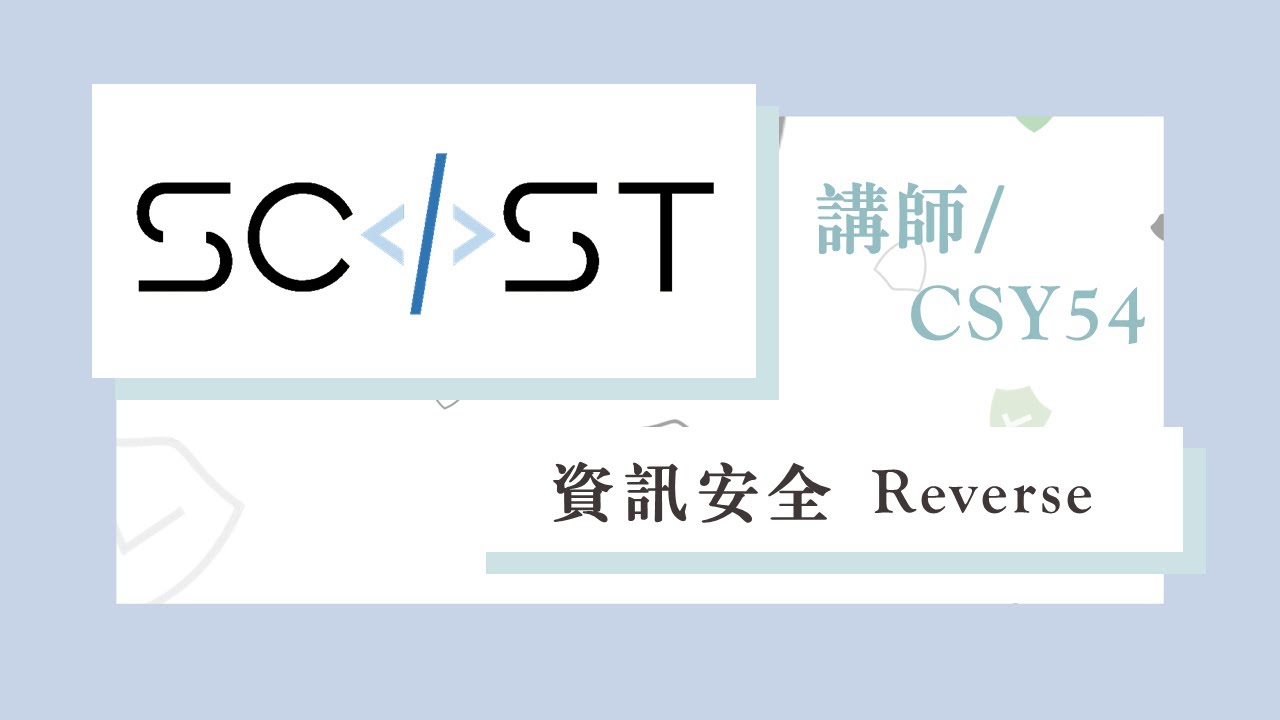python3 -i [file]跑完進入到 REPL mode
Flags
- CF(Carry Flag) : Set if an aritmnetic carry or borrow has indicated,reset otherwise
- ZF (Zero Flag) : Set if an arithmetic result is 0, reset otherwise
- SF (Sign Flag) : Set if the result is negative (MSB = 1)
- OF(Overflow Flag) : Set if an arithmetic overflow has occurred, reset otherwise
Practice
Expression CF ZF SF OF 1. 1010 - 1010 0 1 0 0 2. 0000 - 0001 1 0 1 0 3. 1110 + 1110 1 0 1 1
objdump
$ objdump -M intel -d <binary>
compile
$ vim hello.c
$ gcc hello.c (filename `a.out` by default)
$ file hello.c
$ ./a.out
common commands
strings
strace
grep
IDA Pro
F5 -> pseudocode
shift + F12 -> Strings window
Z3
Variable type
Int : ℤ
Real : ℝ
Bool : boolean
BitVec : Bit Vector, provide variable-length integer
Bool(‘t’) define t as a boolean variable
BitVec(‘x’,32) define x as a 32bit data
Variable
x = Int('x')
y = [Int(f'x_{i}') for i in range (30)]
Result
- SAT - results are in
s.model() - UNSAT - use
reason_unknown()to get the reason
Basic
from z3 import *
# Create Variables
x = Int('x')
y = Int('y')
s = Solver() # Initialize solver
# Add constraints
s.add(x + y > 5)
s.add(y < 3)
s.add(x > 3)
# Check if is SAT
if s.check() == sat:
print(s.model())
else:
print('unsat')
Multiple Solutions
e.g.
an array(len==20)
while s.check() == sat:
m = s.model()
print(''.join(str(m[x[i]]) for i in range(20)))
con = [x[i] != m[x[i]] for i in range(20)]
s.add(Or(con))
else:
print('unsat')
Angr - A binary analysis framework
usage
from angr import *
p = Porject('./a.out', auto_load_libs = False) # load binary
st = p.factory.entry_state() # create state
sm = p.factory.simgr()
# run
sm.step()
sm.run()
sm.explore(find=0xface, avoid=0xdead)
sm.explore(find=(0xface, 0xcafe, ), avoid=(0xdead, 0xbeef, ))
sm.explore(find=lambda s: ..., avoid=lambda s: ...)
Common Procedure
- Load binary
- Create state
- Add symbolic variables
- Constrain the state with symbolic variables
- Create simulation manager
- Tell simulation manager where to explore
- Run
- Get our constrained variables’ value
Claripy
BVS Bitvector Symbolic Variable
BVV Bitvector valuex = BVS('x',32) declare x as a 32-bit BitVectory = BVV(0xdeadbeef,32) declare y as a 32-bit value將 y 宣告為 32-bit 的 0xdeadbeef 常數
from claripy import *
s = Solver()
x = BVS('x', 32)
y = BVS('y', 32)
s.add(x == 1)
s.add(y == 2)
print(s.eval(x, 1))
print(s.eval(y, 1))
Add comstraints
#common setup
for x in variables:
st.add_constraints(x >= 0x20)
st.add_constraints(x < 0x7f)
# every character is a number
for x in variables:
st.add_constraints(x >= 48, x <= 57)
flag_chars = [BVS(f'x_{i}' , 8) for i in range(10)]
flag = Concat(*flag_chars + [BVV(b'\n')])
st = p.factory.entry.state(args=[bin, flag]) # pass by argv
st = p.factory.entry_state(stdin=flag) # pass by stdin

